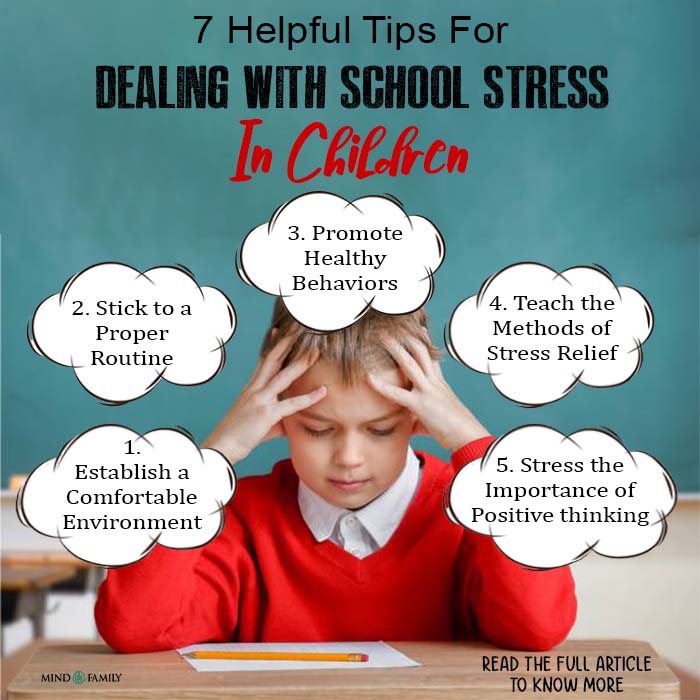As parents, it’s essential to be vigilant and proactive in identifying and addressing school-related stress that may affect our children’s well-being. School stress can manifest in various ways, impacting both their physical health and emotional stability.
Understanding how to recognize the signs of stress and knowing how to provide effective support can make a significant difference in helping our children manage these pressures. In this article, we will explore five alarming signs of school stress in children.
We will also offer seven practical parenting tips to help you support your child through these challenging times. We can help our children navigate their school years with greater ease and confidence.
5 Alarming Signs of School Stress In Children

1. Physical Complaints
Signs of school stress in children often manifest through physical symptoms. Frequent complaints of headaches, stomachaches, or unexplained fatigue could be their way of signaling stress.
If these complaints occur around times of significant school events, such as exams or presentations, they may be more than just minor ailments. Persistent physical complaints can indicate that the pressures of school are taking a toll on your child’s health and well-being.
2. Changes in Sleep Patterns
A significant change in your child’s sleep patterns can be a red flag for stress. Difficulty falling asleep, frequent waking during the night, or excessive daytime sleepiness are all signs that your child might be struggling with school-related anxiety.
Stress often disrupts the quality of sleep, leading to increased fatigue and affecting your child’s overall mood and ability to concentrate during the day.
3. Mood Swings and Behavioral Changes
Be attentive to sudden changes in your child’s mood or behavior. If they become unusually irritable, withdrawn, or exhibit dramatic mood swings, it could be a sign that they are dealing with stress from school.
School stress in children can affect children’s emotional regulation, making them more prone to outbursts or isolation. Observing these behavioral changes closely can help identify if school pressures are influencing their emotional state.
4. Decline in Academic Performance
A noticeable decline in academic performance can be a significant indicator of stress. If your child’s grades drop suddenly, they show a lack of motivation towards their schoolwork, or they struggle to concentrate on tasks they previously managed well, it might be due to stress.
This decline could reflect their inability to cope with academic pressures or anxiety about their performance, making it crucial to address these issues promptly.
5. Social Withdrawal
If your child begins to withdraw from social interactions, seems increasingly isolated, or expresses a strong reluctance to attend school or participate in social activities, this could signal stress.
Social withdrawal often accompanies feelings of anxiety or distress related to school, such as bullying or social pressure.
Monitoring their social behavior and encouraging open communication can help address underlying issues that might be causing them to retreat from their peers.
Read More: 5 Signs Of Post-Traumatic Stress Disorder In Kids And How To Deal With Them!
7 Parenting Tips For Dealing with School Stress In Children

1. Create a Supportive Home Environment
Building a supportive home environment is essential for helping your child manage school stress effectively. Create a space where your child feels safe and valued, and where open communication is encouraged.
Let them know that it’s okay to talk about their worries and fears without feeling judged or dismissed. Regularly check in with your child about their day and actively listen to their concerns.
Provide reassurance and validate their feelings by acknowledging their experiences and emotions.
By fostering an environment of empathy and understanding, you can help your child feel more supported and less alone in dealing with their stress.
2. Establish a Consistent Routine
A consistent routine helps in school stress in children and makes them feel secure and can significantly reduce stress. Establish a daily schedule that includes set times for homework, meals, extracurricular activities, and relaxation.
Consistency in daily routines can make transitions between activities smoother and reduce feelings of chaos or unpredictability. Create a visual schedule or checklist to help your child stay organized and manage their time effectively.
Ensure that their routine includes ample time for rest and leisure, as overloading their schedule with activities can contribute to stress. A well-balanced routine provides structure and helps your child feel more in control of their daily life.
3. Encourage Healthy Habits
Encouraging healthy habits is crucial for managing stress and supporting overall well-being. A balanced diet, regular physical activity, and adequate sleep play a significant role in your child’s ability to cope with stress.
Provide nutritious meals that include a variety of fruits, vegetables, and whole grains to fuel their bodies and minds. Encourage regular exercise, such as sports or outdoor play, which can help reduce stress and improve mood.
Establish a consistent bedtime routine to ensure your child gets enough sleep each night. Good physical health supports emotional resilience and can help your child handle stress more effectively.
4. Teach Stress-Relief Techniques
Teaching your child effective stress-relief techniques can empower them to manage their stress more effectively. Introduce them to simple relaxation methods, such as deep breathing exercises, progressive muscle relaxation, or mindfulness practices.
Practice these techniques together to make them a regular part of your child’s routine. Help your child understand how these methods can be used during stressful situations to calm their mind and body.
Encourage them to use these strategies when they feel overwhelmed, whether it’s during a stressful school day or while facing a challenging task. Providing them with these tools can enhance their ability to cope with stress independently.
5. Promote a Positive Attitude
A positive attitude can make a significant difference in how your child handles stress. Help your child develop a growth mindset by emphasizing that effort and perseverance are more important than perfection.
Celebrate their achievements, no matter how small, and provide encouragement during challenging times. Reinforce the idea that mistakes are a natural part of learning and growing.
By focusing on their strengths and progress, you can help your child build confidence and resilience. Encourage them to view challenges as opportunities for growth rather than as obstacles.
This positive outlook can help reduce stress and increase their motivation and enjoyment in school.
6. Monitor Academic Pressure
It’s important to keep an eye on the level of academic pressure your child is experiencing. Excessive homework, demanding projects, or unrealistic expectations can contribute to significant stress.
Regularly communicate with your child’s teachers to stay informed about their workload and academic challenges. If you notice signs of overwhelm, such as declining grades or frustration with assignments, address these concerns promptly.
Help your child break down larger tasks into smaller, manageable steps to make them less daunting. Ensure that they have adequate time to complete their work without feeling rushed.
7. Encourage Breaks and Downtime
Providing your child with regular breaks and downtime is crucial for preventing burnout and reducing school stress in children. Over-scheduling can lead to exhaustion and increased anxiety, so it’s important to balance academic and extracurricular activities with time for relaxation.
Encourage your child to take breaks during study sessions to rest and recharge. Support their involvement in hobbies and interests that they enjoy, as these activities can provide a much-needed mental break from school pressures.
By ensuring that your child has time for leisure and self-care, you help them maintain a healthier balance between work and relaxation, which is essential for managing stress.
Read More: Managing Stress In Children: 10 Helpful Tips For Parents!
A Word From Mind Family
At Mind Family, we understand that dealing with school stress in children can be a significant challenge for children and parents alike.
Recognizing the signs of stress and taking proactive steps to address them can make a profound difference in your child’s well-being and academic experience.
Remember, addressing school stress is not just about managing immediate concerns but also about building resilience and coping skills for the future.
Together, we can make a difference. Let’s work towards creating a balanced and supportive environment where our children can thrive, both academically and personally.
Frequently Asked Questions (FAQs)
What are the signs of school stress in children?
Signs include physical complaints (headaches, stomachaches), changes in sleep patterns, mood swings, decline in academic performance, and social withdrawal.
What are some tips for dealing with school stress in children?
Create a supportive home environment, establish a consistent routine, encourage healthy habits, teach stress-relief techniques, promote a positive attitude, monitor academic pressure, and encourage breaks.
What is academic stress in children?
Academic stress occurs when children feel overwhelmed by school demands, such as homework, exams, and performance expectations, impacting their emotional and physical well-being.












Leave a Reply